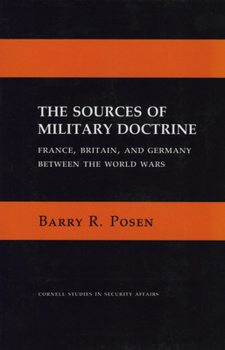The Sources of Military Doctrine: France, Britain and Germany Between the World Wars (Cornell Studies in Security Affairs)
(Part of the Cornell Studies in Security Affairs Series)
Select Format
Select Condition 
Book Overview
Barry R. Posen explores how military doctrine takes shape and the role it plays in grand strategy-that collection of military, economic, and political means and ends with which a state attempts to achieve security. Posen isolates three crucial elements of a given strategic doctrine: its offensive, defensive, or deterrent characteristics, its integration of military resources with political aims, and the degree of military or operational innovation it contains. He then examines these components of doctrine from the perspectives of organization theory and balance of power theory, taking into account the influence of technology and geography. Looking at interwar France, Britain, and Germany, Posen challenges each theory to explain the German Blitzkrieg, the British air defense system, and the French Army's defensive doctrine often associated with the Maginot Line. This rigorous comparative study, in which the balance of power theory emerges as the more useful, not only allows us to discover important implications for the study of national strategy today, but also serves to sharpen our understanding of the origins of World War II.
Format:Paperback
Language:English
ISBN:0801494273
ISBN13:9780801494277
Release Date:August 1986
Publisher:Cornell University Press
Length:288 Pages
Weight:0.97 lbs.
Dimensions:0.7" x 6.3" x 9.4"
Age Range:18 years and up
Grade Range:Postsecondary and higher
Customer Reviews
3 ratings
Political science meets defense policy studies
Published by Thriftbooks.com User , 16 years ago
This is a scholarly work of political science written in the late 1980s that is perhaps best known for a few ancillary conclusions on the nature of military innovation in peacetime, which was a topic of great interest in the 1990s. The purpose of the book was to explore how and why states develop their military doctrine and to assess whether organizational theory (a theory quite popular at the time) or balance of power theory best explained the behavior of French, British and German military and civilian policymakers during the interwar period. Much of the book explores the assumptions each theory holds as to likely state behavior. For instance, organizational theory suggests that military services tend to pursue offensive doctrines that maximize their autonomy and their slice of the defense budget, and that doctrine is often non-innovative as those in positions of authority in hierarchical organizations usually stick with what they know. One of the conclusions reached by Posen is that militaries tend not to innovate and when they do, it is usually due to a combination of direct civilian interference in military affairs along with the support of a maverick, often unpopular, military officer who challenges convention and "breaks crockery" in his attempt to instill a new way of waging war. The two cases of such unlikely innovation addressed by Posen are the development of the Royal Air Force (RAF) Fighter Command for strategic air defense, which has been credited for winning the "Battle of Britain" in 1940, and the development of blitzkrieg by the Germans, which was responsible for the stunning German conquest of France in 1940. Posen argues that both the fledgling RAF and the rebuilt Wehrmacht opposed these innovations. Instead, they promoted and supported doctrines precisely as organization theory would suggest. The RAF was a proponent of strategic bombing, even though when pressed the military air leaders could not articulate precisely how they would threaten Germany - although their prognostications of the destruction that bombers could rain down on cities was not lost on civilian leaders, especially their general assumption that for every 1 ton of munitions dropped there would be 50 civilian casualties. Thus, the civilians insisted on an aggressive air defense plan to ensure that Britain could survive any potential knock-out blow. Posen maintains that it was this civilian insistence on a robust air defense strategy and the leadership of General Hugh Dowding that resulted in the integrated air defense system that held back the improvised strategic bombing campaigns of Hermann Goering and the Luftwaffe in 1940. The German army may have toyed with motor transport and other proscribed technology under Hans von Seekt during the Versailles period of the 1920s, but Posen argues that these experiments merely applied new technology to the old "Hutier" infiltration tactics developed during the later years of WWI. It was the combination
Great Read
Published by Thriftbooks.com User , 24 years ago
Posen's reasoning is lucid and his writing is a pleasure to read. Usually identified as part of the Waltzian or neorealist school of thought in international relations, Posen argues for the primacy of structural factors in explaining unit-level outcomes (in this case, military doctrine). One thing he does not address is potential influence of another unit-level characterisitic, regime type, in determining military doctrine. But overall, an ambitious and cleanly laid out argument.
Why Organizational Theory Does Not Explain Military Doctrine
Published by Thriftbooks.com User , 25 years ago
Barry Posen's work is a comparison of 33 hypotheses drawn from organizational theory and balance of power theory. The test of these hypotheses is the military strategy of interwar France, Germany and Great Britain. While Posen's work has great explanatory value for the formation of military doctrine, what it does in actuality is refute the richness of organizational theory for explaining the sources of military doctrine. The problem is that Posen did not seemingly intend to refute organizational theory.The book offers a well balanced response to the work of Jack Snyder on the ideology of offensive military strategy. I would highly encourage graduate students and facutly of international relations and military science to read this work.






